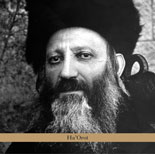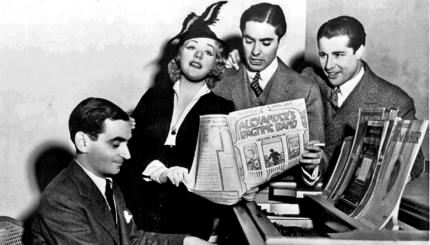I did not expect this. When I got the package in the mail, it definitely felt like a CD. But when I ripped open the packaging, instead of being some self-consciously retro art or a picture of guys in black looking depressed, who should be staring me down but Rav Kook.

This is the music of Greg Wall’s Later Prophets — which I wrote about a few months ago on Nextbook, but hadn’t yet heard the album, which comes out this week. Back then, I said that Rav Kook was
known more for his mystical teachings than his poetry, an omission that probably comes more from the poems’ esoteric nature than from a lack of quality. But HaOrot aims to change that. By placing his poems in a 1960s spoken-word context—crashing free-jazz piano, high-hat-intensive drums, words purred into the mic like Allen Ginsberg describing his latest otherworldly vision—Wall and Marmorstein recast Kook’s words in the context of a more contemporary poetry, effectively mirroring their religious journey in the other direction.
Well, now we’ve got the album, and it’s a doozy. From the chill jazz of “The One Who Seeks the Good” to the the spaced-out noise experiments on “From a Distant World,” HaOrot endeavors to be faithful to Kook’s poetry while not being limited by it. How many poetry tributes have instrumental tracks, after all? A bass carries the melody of the wordless niggun on “Rav Kook’s Melody,” a kind of restrained intensity that finally — and passionately — bursts loose almost halfway through the six-minute track. The language switches between English and Hebrew, sometimes between songs and sometimes line by line, so your brain is always lurching forward to catch up with the pieces. At the same time, the music itself is so fine-tuned and resonant that it almost dares the listener not to keep up, to relax and let the sounds work their magic on you — so that, even if you don’t understand everything fully, you’re still hit with the full brunt of it.
Rav Kook himself — you can find out more about his life here, or his teachings here — was the product of an intermarriage: his father’s family were all great Lithuanian rabbis; his mother’s family were great Hasidic rabbis. His own school of thought borrowed significantly from both philosophies: there is both immense discipline and immense creativity.
This strikingly affects his poetry, and its feeling possesses this music. The straightforward a-a-b-b rhyme scheme for some of his work runs up against the free-verse feeling of other pieces; the music plays against it, providing a perfect counterbalance. This is the opposite of hip-hop, almost. There is the strict, steady beat of the poem, and the instruments flying in every direction around it. It’s a curious and exciting mix of poetry, rhythm, and raw sound. Bandleader Greg Wall’s Later Prophets have played together for so long that they know what to expect of each other, even when the musicians are trying to keep each other on their toes — but the whole disc plays like a three-way collaboration: between the band, Rabbi Itzchak Marmorstein’s convincing renditions of the text, and Rav Kook himself.
It’s weird to have a jam session with someone who’s already dead (er, whose soul has already ascended), but it’s not so unusual — people did it with Louis Armstrong, they did it every time somebody plays a cover version of a song, and they’re doing it with Rav Kook. And I can think of few people who deserve it more.
HaOrot is available from Amazon or directly from Tzadik. Greg Wall’s Later Prophets will play the Jewish Music Cafe in Park Slope this Saturday night, March 28, with guest vocals from Matthue Roth (yes, that’s me) and opening act Moshe Weidenfeld.
Hasidic
Pronounced: khah-SID-ik, Origin: Hebrew, a stream within ultra-Orthodox Judaism that grew out of an 18th-century mystical revival movement.
Moshe
Pronounced: moe-SHEH, Origin: Hebrew, Moses, whom God chooses to lead the Jews out of Egypt.

